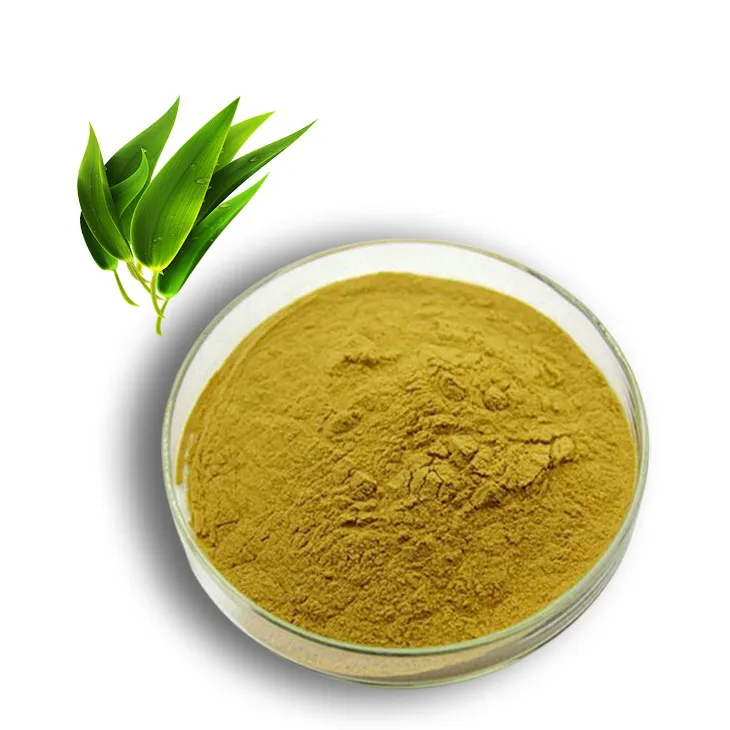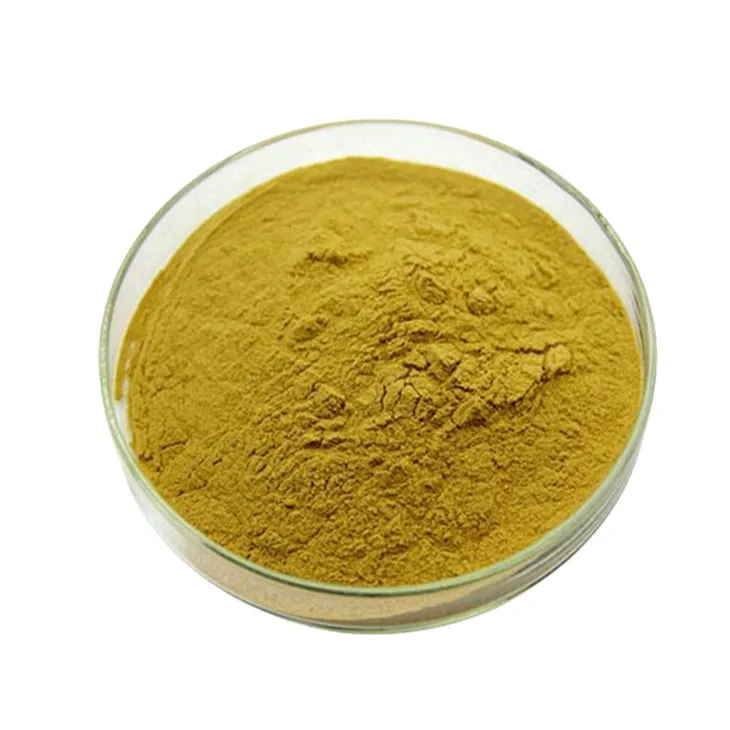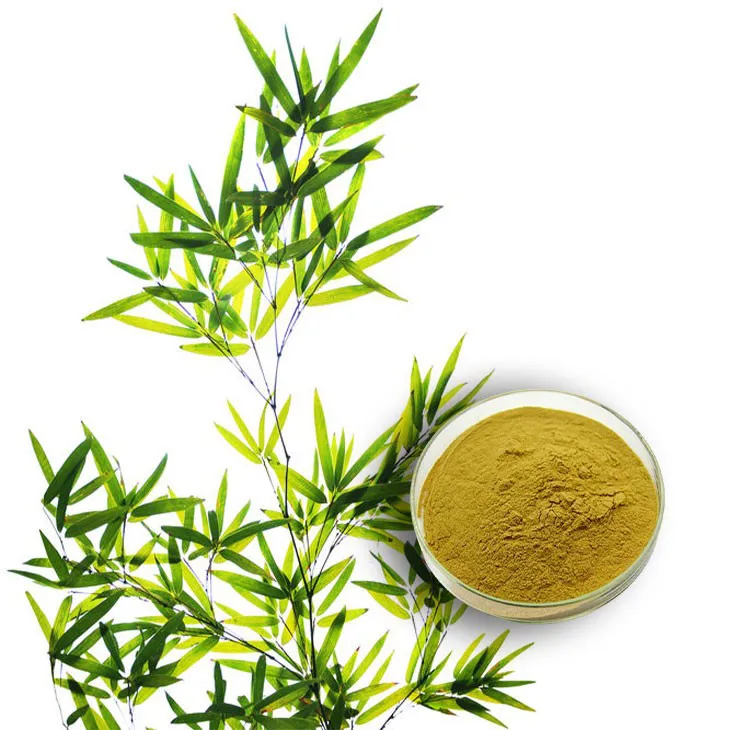- 0086-571-85302990
- sales@greenskybio.com
Bamboo Leaf Extract Manufacturer.
2024-11-28

Introduction to Bamboo Leaf extract Manufacturing
Bamboo Leaf extract manufacturers play a vital role in the utilization of bamboo leaves. Bamboo, as a sustainable and abundantly available resource, contains a rich variety of beneficial substances within its leaves. These manufacturers are responsible for transforming these leaves into valuable extracts that can be used in multiple industries.

The Extraction Process Optimization
1. Importance of Optimization
One of the most crucial aspects for Bamboo Leaf extract manufacturers is the optimization of the extraction process. This is not only about increasing productivity but also ensuring the highest quality of the final product. By optimizing the extraction process, manufacturers can maximize the yield of the desired substances from the bamboo leaves while maintaining or even enhancing their quality.2. Parameters Adjustment
There are several key parameters that manufacturers can adjust during the extraction process. For example, temperature plays a significant role. Different substances in bamboo leaves may have different solubility at various temperatures. By carefully controlling the temperature, manufacturers can ensure that the target compounds are effectively extracted. Another important parameter is pressure. Adjusting the pressure can also influence the extraction efficiency. In some cases, higher pressure may be required to break down the cell walls of the bamboo leaves more effectively, allowing the extraction agents to access the internal substances more easily. Extraction time is also a factor that needs to be considered. Too short an extraction time may result in incomplete extraction, leaving a significant amount of valuable substances in the leaves. On the other hand, if the extraction time is too long, it may lead to the degradation of some sensitive compounds or the extraction of unwanted substances.3. Solvent and Extraction Agent Selection
Manufacturers may also experiment with different combinations of solvents or extraction agents. Different solvents have different affinities for various substances in bamboo leaves. For example, some solvents may be more effective in extracting certain types of flavonoids, while others may be better for extracting alkaloids. By finding the optimal combination of solvents, manufacturers can achieve a more comprehensive and efficient extraction. Some common solvents used in bamboo leaf extraction include ethanol, water, and ethyl acetate. Ethanol is often preferred due to its relatively good solubility for a wide range of compounds, as well as its safety and ease of handling. Water is also a natural and environmentally friendly option, especially when targeting water - soluble substances in bamboo leaves. Ethyl acetate can be useful for extracting lipid - soluble components.
Market Considerations
1. Regulatory Requirements
In the market, bamboo leaf extract manufacturers need to be highly aware of the regulatory requirements in different regions. Since bamboo leaf extracts are used in a variety of products, such as dietary supplements and natural health products, compliance with safety and quality standards is of utmost importance. Different countries and regions may have different regulations regarding the use, labeling, and safety assessment of these extracts. For example, in the United States, dietary supplements are regulated under the Dietary Supplement Health and Education Act (DSHEA). Manufacturers need to ensure that their products meet the requirements set by the Food and Drug Administration (FDA) in terms of ingredient safety, labeling accuracy, and manufacturing practices. In the European Union, natural health products are subject to strict regulations as well. Manufacturers must comply with directives such as the Novel Food Regulation, which governs the introduction of new food ingredients, including those from bamboo leaf extracts. This requires thorough safety evaluations, including toxicological studies and allergenicity assessments.2. Building Consumer Trust
Compliance with regulatory requirements is not only a legal obligation but also a key factor in building trust among consumers. When consumers purchase products containing bamboo leaf extracts, they expect these products to be safe and of high quality. By following strict regulatory guidelines, manufacturers can provide consumers with the assurance that their products have been tested and meet the necessary standards. In addition to regulatory compliance, manufacturers can also build consumer trust through other means. For example, they can be transparent about their production processes, including the source of the bamboo leaves, the extraction methods used, and any quality control measures implemented. This transparency can help consumers make more informed decisions and increase their confidence in the products.
Collaborations with Research Institutions
1. Understanding Biological Activities
Bamboo leaf extract manufacturers often collaborate with research institutions. These collaborations are extremely beneficial as they can lead to a deeper understanding of the biological activities of bamboo leaf extracts. Research institutions have the expertise and resources to conduct in - depth studies on the chemical composition and physiological effects of these extracts. For example, recent research has uncovered new antioxidant and anti - inflammatory properties of bamboo leaf extracts. Antioxidants are substances that can neutralize harmful free radicals in the body, which are associated with various diseases such as cancer, heart disease, and neurodegenerative disorders. Anti - inflammatory properties can help reduce inflammation in the body, which is also a key factor in many chronic diseases. By understanding these properties, manufacturers can better promote their products in the market, highlighting their potential health benefits.2. Sustainable Extraction Practices
Collaborations with research institutions also contribute to the development of sustainable extraction practices. As the demand for bamboo leaf extracts grows, it is essential to ensure that the production process is environmentally friendly. Research institutions can help manufacturers find more sustainable ways to extract the desired substances from bamboo leaves. For instance, they can study ways to reduce the use of harmful solvents or develop more energy - efficient extraction methods. They can also explore ways to recycle and reuse the extraction agents, minimizing waste and environmental impact. In addition, research can focus on the sustainable cultivation of bamboo, ensuring a continuous supply of high - quality raw materials while protecting the environment.
Conclusion
Bamboo leaf extract manufacturers face multiple challenges and opportunities. Through optimizing the extraction process, complying with market regulations, and collaborating with research institutions, they can produce high - quality extracts, meet market demands, and contribute to the development of a sustainable and healthy industry.
FAQ:
1. What are the main challenges faced by bamboo leaf extract manufacturers?
One of the main challenges is the optimization of the extraction process. Manufacturers need to constantly adjust parameters such as temperature, pressure, and extraction time, and also experiment with different solvent combinations to improve the yield and quality of the extracts. Another challenge is complying with the regulatory requirements in different regions, as bamboo leaf extracts are used in various products like dietary supplements and natural health products.
2. How do bamboo leaf extract manufacturers ensure the quality of their products?
They ensure product quality by optimizing the extraction process to get a high - quality extract. Also, they need to be compliant with safety and quality standards in different regions as the extracts are used in multiple products. Collaborating with research institutions can also help in understanding the biological activities better, which in turn can contribute to quality control.
3. Why do bamboo leaf extract manufacturers collaborate with research institutions?
Manufacturers collaborate with research institutions to gain a deeper understanding of the biological activities of bamboo leaf extracts. For example, research can discover new antioxidant or anti - inflammatory properties. These findings can be used to promote their products in the market. Moreover, such collaborations can contribute to the development of sustainable extraction practices, making the production process more environmentally friendly.
4. What is the importance of extraction process optimization for bamboo leaf extract manufacturers?
The extraction process optimization is very important for bamboo leaf extract manufacturers. By optimizing this process, they can improve the yield and quality of the extracts. For example, by adjusting parameters like temperature, pressure, and extraction time, and trying different solvents or extraction agents, they can get better results, which is crucial for their business in terms of product quality and competitiveness.
5. How do regulatory requirements affect bamboo leaf extract manufacturers?
Regulatory requirements have a significant impact on bamboo leaf extract manufacturers. Since the extracts are used in various products such as dietary supplements and natural health products, compliance with safety and quality standards in different regions is crucial. Meeting these requirements helps build trust among consumers and ensures the products can be legally sold in different markets.
Related literature
- Bamboo Leaf Extract: Properties and Potential Applications"
- "Sustainable Extraction of Bamboo Leaf Extract: A Review"
- "Bamboo Leaf Extract in the Dietary Supplement Industry: Regulatory and Quality Considerations"
- ▶ Hesperidin
- ▶ citrus bioflavonoids
- ▶ plant extract
- ▶ lycopene
- ▶ Diosmin
- ▶ Grape seed extract
- ▶ Sea buckthorn Juice Powder
- ▶ Beetroot powder
- ▶ Hops Extract
- ▶ Artichoke Extract
- ▶ Reishi mushroom extract
- ▶ Astaxanthin
- ▶ Green Tea Extract
- ▶ Curcumin Extract
- ▶ Horse Chestnut Extract
- ▶ Other Problems
- ▶ Boswellia Serrata Extract
- ▶ Resveratrol Extract
- ▶ Marigold Extract
- ▶ Grape Leaf Extract
- ▶ blog3
- ▶ blog4
-
The best aged garlic extract on the market.
2024-11-28
-
How to make powder with L - arginine.
2024-11-28
-
Certified organic hawthorn extract.
2024-11-28
-
Bulk purchase of mulberry leaf extract.
2024-11-28
-
Wholesale Suppliers of Eyebright Extract.
2024-11-28
-
Certified organic jujube extract.
2024-11-28
-
Artichoke Extract
2024-11-28
-
Curcuma Longa Extract/Turmeric extract
2024-11-28
-
Genistein
2024-11-28
-
Saffron Extract Powder
2024-11-28
-
Elderberry Extract
2024-11-28
-
Scutellaria Extract
2024-11-28
-
Maca Extract
2024-11-28
-
Almond Extract Powder
2024-11-28
-
Tinospora cordifolia extract
2024-11-28
-
Camu Camu Extract
2024-11-28





















